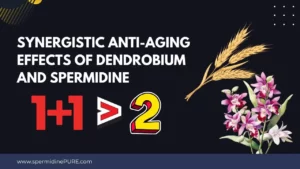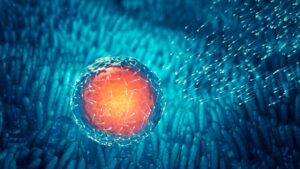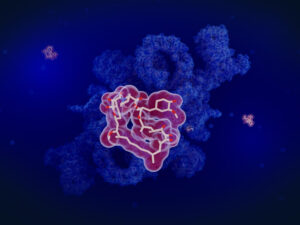Spermidine is a naturally occurring polyamine found in all living cells, including humans. It has been gaining attention in recent years as a potential anti-aging supplement due to its ability to induce autophagy, a process by which cells remove damaged or dysfunctional components.
Studies have shown that spermidine levels decline with age, and that increasing intake of spermidine-rich foods or supplements may have anti-aging effects. While more research is needed to fully understand the mechanisms behind spermidine’s potential anti-aging effects, early studies suggest that it may improve cellular health, boost mitochondrial function, and reduce inflammation.
Despite the promising early research, it is important to note that spermidine is not a magic bullet for anti-aging. Lifestyle factors such as diet, exercise, and stress management are still the most important factors in maintaining health and longevity. However, spermidine may be a useful tool in promoting healthy aging and preventing age-related diseases, and further research is needed to fully understand its potential benefits.
What is Spermidine?
Spermidine is a natural polyamine compound that is present in all living organisms, including plants, animals, and bacteria. It was first discovered in semen, hence the name, but it is now known to be present in many different tissues and organs throughout the body.
Although spermidine is not yet as well studied as other supplements, ongoing research has been emerging around spermidine, making it a notable resource in the realm of longevity, cognitive function, and cancer. It has been found to have a lot of potentials, from anti-aging to improved cognition.
One of the most interesting aspects of spermidine is its ability to trigger autophagy, which is the body’s natural process of cleaning out damaged cells and replacing them with new ones. This process is essential for maintaining healthy tissues and organs, and it is thought to be a key mechanism by which spermidine appears to slow down aging and support longevity.
Spermidine Benefits for Anti-Aging
Promotes Autophagy
Spermidine has been shown to promote autophagy, the natural process of cellular self-cleaning and recycling. As we age, the efficiency of autophagy decreases, leading to the accumulation of damaged cellular components and the development of age-related diseases. By inducing autophagy, spermidine helps to remove these harmful components, promoting cellular health and longevity.
Increases Cellular Regeneration
Spermidine has also been found to increase cellular regeneration, which is crucial for maintaining healthy tissues and organs. By stimulating the production of new cells, spermidine helps to replace damaged or dying cells, leading to improved tissue function and overall health.
Reduces Oxidative Stress
Oxidative stress, caused by an imbalance of free radicals and antioxidants in the body, is a major contributor to the aging process. Spermidine has been shown to reduce oxidative stress by increasing the production of antioxidants and decreasing the production of free radicals. This helps to protect cells from damage and slow down the aging process.
Overall, spermidine has shown promising anti-aging benefits through its ability to promote autophagy, increase cellular regeneration, and reduce oxidative stress. While more research is needed to fully understand its effects, incorporating spermidine-rich foods into your diet or taking spermidine supplements may be a beneficial addition to an anti-aging regimen.
Spermidine Sources
Foods High in Spermidine
Spermidine is a natural compound found in various foods. Here are some foods that are high in spermidine:
- Wheat germ
- Soybeans
- Green peas
- Mushrooms
- Corn
- Broccoli
- Cauliflower
- Spinach
- Asparagus
- Chicken
It is important to note that the spermidine content in these foods may vary depending on the source, the season, and the processing. However, incorporating these foods into your diet can increase your spermidine intake.
Supplements
Spermidine supplements are also available in the market. These supplements are usually derived from natural sources such as wheat germ or soybeans. Here are some popular spermidine supplements:
| Brand | Product Name | Source | Form |
|---|---|---|---|
| Longevity Labs | SpermidineLife® Extra+ | Wheat germ | Capsules |
| Oxford Healthspan | Primeadine | Soybeans | Capsules |
| Double Wood Supplements | Spermidine | Wheat germ | Capsules |
It is important to consult with a healthcare professional before taking any supplements, especially if you have any medical conditions or are taking any medications. Additionally, supplements should not be used as a substitute for a balanced diet. In conclusion, spermidine can be obtained through various natural sources such as wheat germ, soybeans, and green peas. Spermidine supplements are also available in the market, but it is important to consult with a healthcare professional before taking any supplements.
Spermidine Dosage and Safety
Recommended Dosage
According to recent research, a good starting dose of spermidine is between 1-3 mg per day. However, the optimal dosage for spermidine supplementation has not yet been established. The dosage may vary depending on the individual’s age, sex, and overall health condition. It is recommended to start with a low dose and gradually increase it over time.
Potential Side Effects
Spermidine is generally considered safe for consumption. However, some individuals may experience mild side effects such as nausea, diarrhea, and stomach discomfort. These side effects are usually temporary and subside once the body adjusts to the supplement. It is important to note that spermidine may interact with certain medications, such as antidepressants and blood thinners. Therefore, individuals who are taking medication should consult with their healthcare provider before taking spermidine supplements. Overall, spermidine is a promising anti-aging supplement that may help slow down the aging process and improve overall health. However, it is important to follow the recommended dosage and consult with a healthcare provider before taking any new supplement.
Conclusion
Spermidine is a natural polyamine that has been shown to have anti-aging properties. It has been suggested that spermidine levels decline with age, and that a possible connection exists between reduced endogenous spermidine concentrations and age-related deterioration. Recent epidemiological data support this notion, showing that an increased uptake of spermidine-rich food diminishes overall mortality associated with aging.
Studies have shown that spermidine can delay aging in humans by maintaining telomere length, reducing inflammation, improving cognitive function and memory, and promoting autophagy. Although more research is needed, the benefits of spermidine have been observed throughout and hold promise for the future of anti-aging medicine.
It should be noted that spermidine is not a miracle cure for aging. While it has been shown to have beneficial effects, it is not a substitute for a healthy lifestyle. Eating a balanced diet, getting regular exercise, and avoiding harmful habits such as smoking and excessive alcohol consumption are still the most effective ways to promote healthy aging.
Overall, spermidine is a promising avenue for anti-aging research. While more studies are needed to fully understand its mechanisms and potential benefits, the evidence thus far suggests that spermidine may play an important role in promoting healthy aging and extending lifespan.



